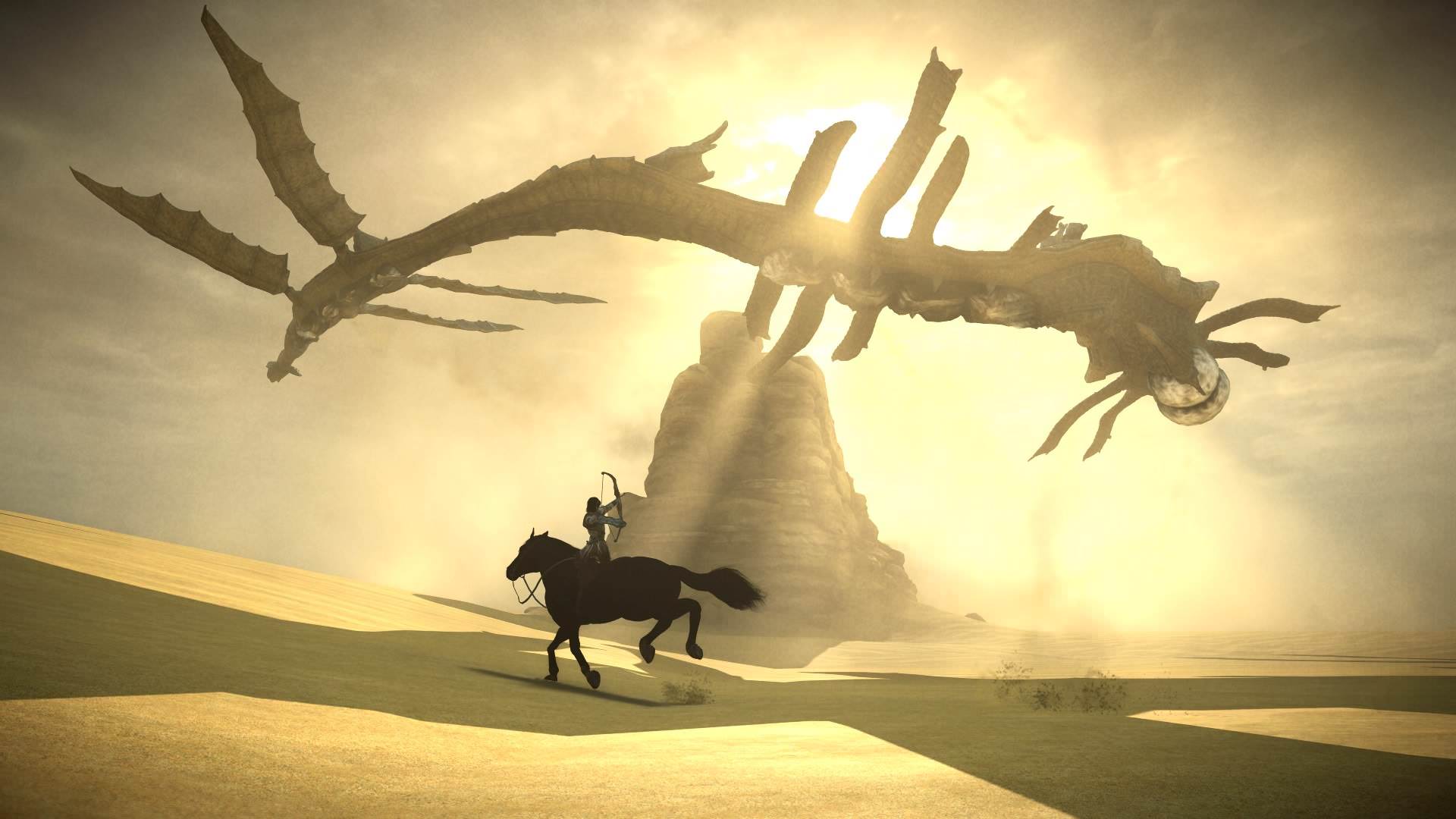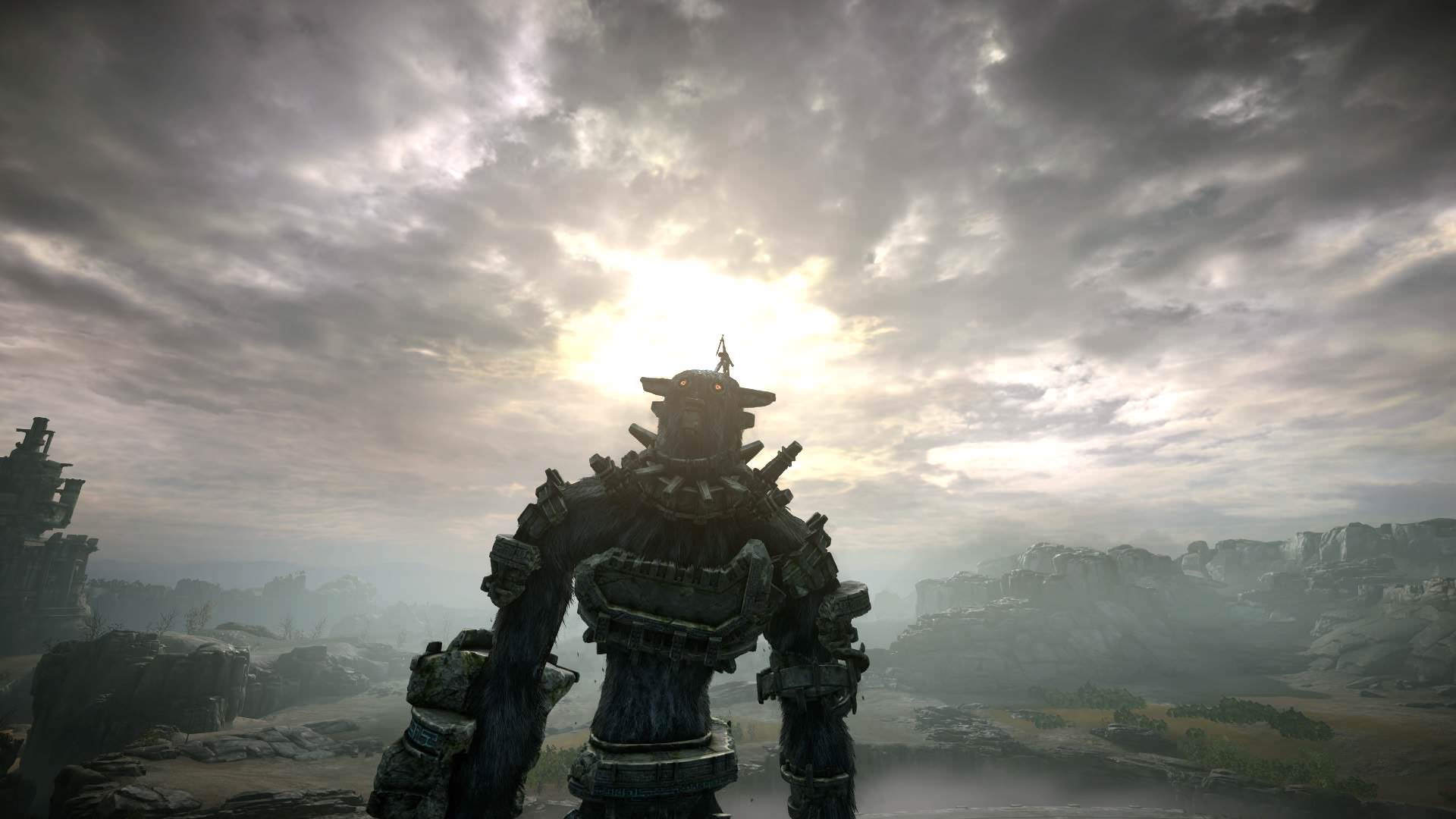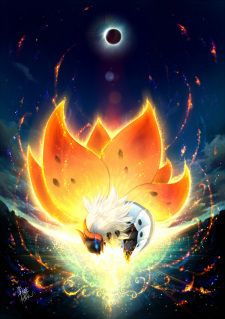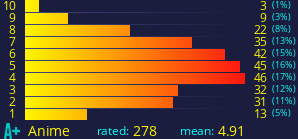|
None of the artwork used are mine. Many thanks to their respective creators.
I use a mildly complicated tagging and ordering system for my anime list. Please click HERE for easier navigation. (Won't work properly for mobile.) Explanations below. I've left notes for almost every show I've watched. Some of these end up being mini-reviews. Some of them will contain spoilers, though I'll try to warn you beforehand. I highly recommend using Ctrl+F if you want to find a particular show. If you want to be friends, don't just send a FR and be done with it. Chat me up. Let's talk a bit. If I don't know who you are, expect to be denied. Be civil.  この村では、見事に実った麦穂が風に揺られることを狼が走るという。 In this village, when the ripened ears of wheat sway in the breeze, it is said that a wolf runs through them. 風に揺られる様子が、麦畑の中を狼が走っているように見えるからだ。 This is because one can make out the form of a running wolf in the shifting stalks of the wheat fields. また、風が強すぎて麦穂が倒れることを狼に踏まれたといい、不作の時は狼に食われたという。 When the wind is too strong and the stalks are blown over, it is said that the wolf has trampled them. When the harvest is poor, it is said that the wolf has eaten it. 上手い表現だが、迷惑なものもあるのが玉に瑕だな、と思った。 It was a nice turn of phrase, but it had a troublesome aspect that flawed it, she felt. しかし、今となってはちょっとした洒落た言い方になっているだけで、昔のように親しみと恐れをこめてその言葉を使う者はほとんどいない。 Still, lately it was a popular sort of expression, and there were few remaining who wielded it with the sort of familiarity or awe it had held in the past. ゆらゆらと揺れる麦穂の間から見える秋の空は何百年も変わらないのに、その下の様子は実に様変わりをしていた。 Although the autumn sky that was visible between the swaying stalks of wheat had not changed in hundreds of years, conditions below that sky had indeed changed. 来る年も来る年も麦を育ててきたこの村の者達も、せいぜい長生きして七十年なのだ。 The villagers who tended the wheat as the years passed lived for seventy years at the most. むしろ何百年も変わらないほうが悪いのかもしれない。 Perhaps it would be worse for them to go centuries without changing. ただ、だからもう昔の約束を律儀に守る必要はないのかもしれないとも思った。 Maybe that is why there is no need for them to honor the ancient agreement, she thought. 何よりも、自分はもうここでは必要とされていないと思った。 In any case, she knew she no longer had a place here. 東にそびえる山のせいで、村の空を流れる雲はたいてい北へと向かっていく。 The mountains that rose in the east caused the clouds over the village to drift mostly north. その雲の流れる先、北の故郷のことを思い出してため息をつく。 She thought of her homeland beyond those drifting clouds and sighed. 視線を空から麦畑に戻せば、鼻先で揺れる自慢の尻尾が目に入った。 Returning her gaze from-the sky to the fields, her eyes fell upon her magnificent tail, which twitched just past her nose. することもないので尻尾の毛づくろいに取り掛かる。秋の空は高く、とても澄んでいた。 With nothing better to do, she set to grooming it. The autumn sky was high and clear. 今年もまた収穫の時期がくる。 Harvest time had come again. 麦畑を、たくさんの狼が走っていた。 Many wolves were running through the wheat fields.   On Filters: If you click on 'Filters' and set the Primary Filter to 'Score, Descending order' and the Secondary Filter to 'Rewatch Value, Descending order', all the shows will be arranged according to score and their respective tag order. Shows without the corresponding tags are ordered indiscriminately. Watching priorities: Ignore every list except 'Completed' and 'Dropped'. Consider all my other lists as my PtWs. On Tags: I've accepted that my scores will forever be indecisive, and decided to implement a .5 system. This should be fairly obvious. If there are certain numbers and an order in the tags, it pertains to their order of release and my preferences within that series. I will put such tags in the first installment of the series. Example #1) For the Pokémon movies I prefer them in the following order: 1 (Mewtwo) > 5 (Lati@s) ≥ 2 (Lugia) > 4 (Celebi) > 3 (Entei). This tag order will be shown in the first Pokémon movie. Example #2) For the Saki series I prefer them in the following order: spin-off (Achiga-hen) > spin-off-specials > 2 (Nationals) > 1 (original). This tag order will be shown in the original Saki (2009). 💗: The heart tag is reserved for Clannad: After Story. I hope I chance upon a show that evokes thoughts and emotions stronger than this one. 🍎: The apple tag is reserved for Death Note, the dividing line between 9/10 and 10/10. ⭐: The star tag is for my extended favorites. ✨: The sparkles tag is for shows that I believe, regardless of their score, to either have opened up a new perspective of a genre or execution for me or have done one sort of execution exceedingly well, and deserves recognition for that sole fact. ⚖️: The scales tag is for shows that I need to re-watch and re-score down the line. This will be almost exclusively for higher-rated shows: I don't care enough for 3~4/10s to re-watch them. How I rate: No anime is for everyone, just like no food, music, book, or movie is: no one can like everything, and nothing can be liked by everyone, no matter what it is. This is why I tend to look at shows in terms of genres: they each have their own mechanisms and tropes, they require some background knowledge without which they cannot be truly appreciated, and each of them appeal to a different audience. Most importantly, however, some elements can be completely ignored in favor of serving their dominant genres, which allows for a better understanding of what a show actually is and isn't about. Comedy and medieval romance can sometimes cast aside logic to accentuate humor/pay-off, a show heavily focused on romance can downplay its other aspects in order to better illustrate their characters' relationship, etc. The execution of such tropes is what I value most: I don't care if I've seen them somewhere else, or that they were unoriginal. If a show executes its genre-specific tropes masterfully, I will praise it to no end. How I deem such executions as good or bad is, for the most part, quite subjective. Having said so, originality or a rare subject matter is also intriguing, and I will rate those based on their own merits. I also judge based on length quite harshly: if not enough time is invested on important plot points/characters my experience will be less enjoyable. On the other hand, if too much time is spent on unimportant plot points/characters, the most frequent emotion I will recall from watching a show will be boredom. Proper pacing is very important: I don't watch anime to doze off to sleep. I tend to look at ratings in groups: after all, a 1-10 scale is relative by nature. Examples also help to clarify my understanding of my ratings for myself, as well. I find that the more I fuss over the technical aspects of a show--its directing, use of music, SFX, animation, etc.--the more it means that I didn't enjoy the show. If I really enjoyed something it should be to the point that I can FORGET its shortcomings--if I remember less (specifically) of something, the more it usually means that I actually enjoyed it. I'm by no means a perfect judge of quality: not even close. Even though I've waxed on a lot, my prevailing rating standard is my own entertainment. If I didn't like it, the score gets lower, and if I loved it, it gets higher. I'm only human. Rating explanations: 6~10 -> differing levels of 'good/above average' 1~5 -> differing levels of 'bad/below average' 10 : If a show is 10/10 it means that, for all intents and purposes, it lies outside my own rating system. It could have multiple flaws that others bemoan over in other titles: awkward pacing, an ass-pull of an ending, irrelevant filler arcs, terrible animation, emotional manipulation, etc. Guess what though? I don't care. Its strengths and its impact on me are to such a degree that I am willing to completely overlook these potentially disastrous flaws. No, I might be willing to bullshit my way through what other people may consider 'flaws' to be genuine strengths of the show, and that they provide the variety of flavors the show needs to appeal to more people. This is the realm of undisguised favoritism. These shows have reached some form of apex in their respective genres, executions, or use of props, and have thus transformed the way I look at any audiovisual media. 🍎 : Death Note. A disappointing second half saddles it with a 9; even so, Death Note remains one of the best mystery/thriller shows I have ever watched, and among the very best shows I have ever seen out of any media. Regardless of genre, to be a 10, in terms of overall quality, a show must be superior to Death Note in some way or form. 9 : Special. Being good is not enough: these grip my attention like nothing else, and enthrall me in various aspects. I don't readily hand out 9s or 10s: I need time to process my overall verdict on the show, and sometimes this will last several days, if not weeks, for me to determine whether a show possesses some incredible quality that I cannot ignore. I may have re-watched these shows and unintentionally binge-watched an entire season overnight, or gone through several articles/wiki pages, trying to learn every little detail about it. I am willing to give a free pass to certain flaws if I perceived the strengths of the show to be vastly superior to its weaknesses: thus, my personal bias is probably the most transparent here. I will briefly mention critical flaws whenever I can, though. 8 : A glimpse of brilliance. These are great shows that must excel in at least one point. Some parts/scenes/props will stick with me forever. Otherwise, a show may be so generally well-polished that, although I have no extremely vivid memories of one particular aspect, I may consider the sum of its parts to be quite stellar. 7 : Fun and effective. Overall an enjoyable experience, although nothing quite resonated with me. This is perhaps where I start saying I truly 'liked' something. 6 : Decent. The good is ever so slightly better. Some flaws drastically and constantly dragged down the show, yet its merits still allowed it to be of a respectable standard. I am glad these shows exist, for they provide more variety for me to improve on my own tastes. 5 : Put nicely, mediocre; put bluntly, below average. The goods and bads will balance themselves out to form a shaky equilibrium--and usually the bad will win out. 4 : Lost potential / disappointing / "...Well, you tried." The show was at times appealing, but the flaws stick out like a sore thumb, and I will, reluctantly, point them out in detail. These guys either missed the memo on what their medium allows them to do, or just can't be bothered to stick with what their story/genre entails them to do: thus, they fail to even be mediocre. Turns out being mediocre isn't that easy. 3 : Thoroughly unappealing. The show is starting to cross the point of no return: it is so bad in all aspects, that, aside from a few interesting episodes/arcs/quirks, I rapidly lose interest in everything. If 4s lacked the writing or execution to pull through with a central theme, 3s are where 'central themes' lose all meaning. If none of these apply, then this rating is marked by my own lack of interest I experienced while watching: I don't care about the characters, what they do, why they do things...I just didn't care anymore. 2 : Hilariously dismal / infuriatingly lacking. Did I mention not caring in 3? Now I just want it to be fucking over. Bored me to tears. I may have fallen asleep while watching these. Although these shows were downright nauseating to watch, they still had something that saved them from being absolute atrocities, whatever it may be. Even if a show was unimaginably horrible, if I couldn't bring myself to wholeheartedly hate it, it might be a 2. Conversely, even if I intensely hated a show but could not reasonably formulate any excuse for it to become a 1, then I will give it a 2. 1 : Fundamentally flawed. I hate all of these to varying degrees. The following is a list of some conditions that comprise a 1, and many may overlap: a) Sequels that deliberately destroy carefully constructed lore and character development from previous installments while providing nothing of value in return b) Low-effort, blatant money-grabbing & cash cow milking attempts c) Writing, directing, and/or executions that display a fatal lack of storytelling ability on the creators' end d) Frequently rehashing, or even re-broadcasting episodes from previous seasons with little to no editing or new content added to an already lackluster series e) Directly at odds with what I personally believe are key methods/elements that make certain genres work These shows fail at what they set out to do at every turn. If it's comedy, it's not funny; if it's romance, there is no romantic chemistry among the characters; if it's ecchi, it doesn't appeal to the pheromones; if it's horror, it's actually funny, for all the wrong reasons. How did this happen? Why were these shows even made? What did I do to deserve watching these? Show someone you hate these shows and make them ask these questions for you! 0 : TRAUMATIZING. Merely thinking about these shows evokes horrible memories that I wish I could forget. The negative impact that these shows have inflicted on me is such that whenever I begin to notice that any other show possesses some, or several, similarities with these abominations, I involuntarily recoil in pain and disgust. As such, this tag of honor is saved for my personal 'favorites'. You cannot convince me that these are good shows. You are very much free to tell me why you like them though, and I would like to hear your logic--provided they actually make sense. they won't #1. Ghost in the Shell: Stand Alone Complex (2002) - Inner Universe (Origa) #2. serial experiments lain (1998) - Duvet (Bôa) #3. Rozen Maiden Ouvertüre (2006) - Baragoku Otome (ALI PROJECT) #4. Sangatsu no Lion (March Comes In Like a Lion) (2016) - Answer (BUMP OF CHICKEN) #5. Blood+ (2005) - Colors of the Heart (UVERworld) #6. JoJo's Bizarre Adventure (2012) - Bloody Stream (Coda) Neon Genesis Evangelion (1995) - Cruel Angel's Thesis (Takahashi Youko) Clannad: After Story (2008) - Toki wo Kizamu Uta (Lia) Death Note (2006) - What's up, people! (Maximum the Hormone) #1. Puella Magi Madoka★Magica (2011) - Magia (Kalafina) #2. Clannad (2007) - Dango Daikazoku (Chata) #3. Yuru Camp△ (2018) - Fuyu Biyori (Sasaki Eri) Jigoku Shoujo Futakomori (Hell Girl S2) (2006) - Aizome (Noto Mamiko) - main themes and/or leitmotifs being used to convey various moods & situations - acoustic part - quiet part, leading to some insane buildup and pay-off - ambient horror - a perversion of a theme, conveying imminent danger - jazz Cremia's fate here is also absolutely horrific. Her livelihood is destroyed. And, her sister - her last living relative - is mentally ruined. But, the worst part is that it's her fault. Cremia could have prevented this. Romani kept on warning Cremia that something was coming, but Cremia wouldn't listen. Imagine the crushing guilt and loss she must feel. And, all of this is on top of the knowledge that the world will be ending in just a few days. Everything she's ever worked for and cared about is ruined and gone, it's her fault, and she doesn't even have the time to make it right. She's going to die a lonely, miserable, guilty failure, and she KNOWS it. While we are never told directly that Majora is responsible for the aliens, virtually everything bad and unnatural that happens in this game is because of it. It stands to reason that these unnaturally placed aliens are also the work of Majora. It's not enough to take everything away from people. It's not enough to destroy the world. It had to destroy the world in a way that everyone would know was coming. It destroyed the world slowly enough that everyone just had to wait for it to happen. But, even that was not enough. Before the world ends, it took the time to make each and every person miserable in deeply personal and specific ways. When the end comes, Majora watched and laughed as the people of the world lost the wills to live. Everything they cared about was gone and only misery remained. And, worst of all, they knew they'd never have the time to fix it. Majora is the most despicable, evil, horrifying thing ever written in fiction. Cremia's life seems so pleasant compared to all the horrible stuff going on in Termina, after all she has friends and family who care for her, owns the most successful ranch in the area and is herself a beautiful young woman, but when you think about it, her life probably is the most tragic. Her parents are gone, she was thrust into being the head of the ranch, she's a single mother (to her sister), her sister is constantly practicing with a dangerous weapon which causes her to worry, her ranch loses stock every year for unknown reasons, her crush (Kafei) is marrying her best friend (Anju) whom is half convinced that Cremia betrayed her, and her ranch as well as her deliveries get sabotaged by the competition. The catcher is, Link comes in and helps everyone in Termina out, basically fixing what Skull Kid broke, but Cremia's life is going to remain largely the same once Link leaves. None of her problems were caused by Skull Kid. It's no wonder she's so jaded, life has not exactly been kind to her. This is the interaction I tell people about when I’m trying to explain what makes this game so special. The game feels like a fever dream, but if you look close enough, there are so many moments of harsh, sobering reality within it. Ocarina of Time, Wind Waker. Those games were inspired. You can really tell that these games were made by people who had a spark of creativity, a dream or a vision they wanted to realize. But this game does not feel inspired. It feels like it was a compulsion. Like a confession. Like a feeling that could be contained no longer, and burst forth. |
Statistics
All Favorites Favorites
Anime (9)
Character (10)
-
Okazaki, Tomoya
Clannad Movie

-
Sunohara, Youhei
Clannad Movie

-
Joestar, Joseph
JoJo no Kimyou na Bouken: Adventure

-
Zeppeli, Caesar Anthonio
JoJo no Kimyou na Bouken (TV)

-
Kasshu, Domon
Kidou Butouden G Gundam

-
Huang
Darker than Black: Kuro no Keiyakusha

-
van Freeman, Heinrich
Uchuu no Kishi Tekkaman Blade

-
Holo
Ookami to Koushinryou

-
Kisaragi, Aki
Uchuu no Kishi Tekkaman Blade

-
Matou, Sakura
Fate/stay night



























Comments